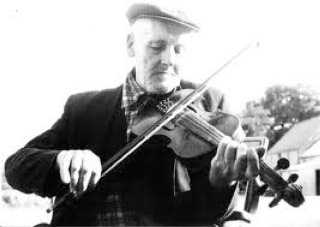The Johnny Doherty Festival, Ardara, Co. Donegal, Ireland, 21 - 23 September 2018.
Following on from the huge success of last years festival which brought people from all over the world to the scenic town of Ardara, the organisers are confident of a successful weekend again this year. The organisers hope to provide something for everyone to enjoy, with Concerts, Ceilis, Barn Dances, Sean Nós, Set Dancing, Workshops, Pub and Street Sessions.

Ardara is a very popular Donegal holiday destination on the Wild Atlantic Way and offers many accommodation types including Hotel, B&B and Airbnb options.
Brid Harper, Dermot Byrne and Steve Cooney
Dermot Byrne has played accordion since a very young age, his seemingly effortless playing, combined with great subtlety, and a faultless ear, makes him one of the great accordion players of his generation.
Brid Harper has been hailed as one of the leading exponents of traditional fiddle playing of our time. She was senior All-Ireland Champion, Fiddler of Dooney and Oireachtas winner in 1988. Brid has released her Solo Album which has been hailed as one of the best traditional albums of 2015.
Australian born Steve Cooney started his professional musical career from the age of seventeen. In 1981 he bought a one-way ticket to Ireland where he joined Stockton’s Wing, playing bass guitar and didgeridoo. Since then he has been very active performing and recording with Dermot Byrne, Sharon Shannon, Mary Black, Sliabh Notes and many others.
Cherish The Ladies
“It is simply impossible to imagine an audience that wouldn’t enjoy what they do,” says the Boston Globe speaking of Cherish the Ladies, the long-running, Grammy-nominated, Irish-American super group that formed in New York City in 1985 to celebrate the rise of women in what had been a male-dominated Irish music scene and has since toured the world, played the White House and the Olympics, recorded 17 outstanding albums including a live recording, “An Irish Homecoming,” which was simultaneously videotaped for a Public Television Special that aired across America and won an Emmy.
Under the leadership of All-Ireland flute and whistle champion Joanie Madden, named by The Irish Voice Newspaper as one of the Top 25 most influential Irish Americans of the past quarter century, these ladies create an evening that includes a spectacular blend of virtuoso instrumental talents, beautiful vocals, captivating arrangements, and stunning step dancing. Their continued success as one of the top Celtic groups in the world is due to the ensembles ability to take the best of Irish traditional music and dance and put it forth in an immensely entertaining show.
The New York Times calls their music “passionate, tender, and rambunctious,” and the Washington Post praises their “astonishing array of virtuosity.” They’ve won recognition as the BBC’s Best Musical Group of the Year and were named Top North American Celtic Group at the Irish Music Awards and not to mention having a street named after them in the Bronx! They’ve collaborated with such musicians as The Boston Pops, The Clancy Brothers, the Chieftains, Vince Gill, Nanci Griffith, Pete Seeger, Don Henley, Arlo Guthrie and Maura O’Connell as well as being the featured soloist with over 250 nights of symphony orchestras.
The Friel Sisters
The Friel Sisters, Anna, Sheila and Clare, are young traditional musicians hailing from Glasgow/Donegal. Born and brought up in Glasgow with their family roots firmly entrenched in the Donegal they play a mixture of music interspersed with songs, many from their family repertoire. Being siblings, they achieve a close blend on fiddle,flute and uilleann pipes approaching their music in a style inspired by many encounters with great musicians and singers throughout Europe & USA. Anna, Sheila and Clare have performed in various venues and festivals including the Glasgow Royal Concert Hall as part of Celtic Connections, the Danish Tonder Festival, Willie Clancy Summer School, Catskill’s Irish Arts Week in New York, Frankie Kennedy Winter School, Sligo Live and at many other festivals. They have appeared as guests on stage with acts such as The Chieftains, Solas, Cherish the Ladies, and Altan on several occasions.
Photo Credits:
(1) The Johnny Doherty Festival,
(2) John Doherty,
(3) Brid Harper, Dermot Byrne and Steve Cooney,
(4) Cherish The Ladies,
(5) The Friel Sisters
(unknown/website).